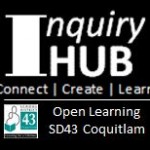
Dave Truss is an educator (Vice Principal) with the Learning Innovations Network, Coquitlam Open Learning (COL), School District #43 in BC, Canada. Dave shared his thoughts and writes about Inquiry in a way that makes it easy to understand. Kathleen McClaskey and I asked Dave some questions about the Inquiry Hub and personalized learning. He shares how his school will fit well with the BCedplan and the future of education in their Province. It fits well with Coquitlam’s School District’s collaborative work on “Learning Without Boundaries”.
Q. What is The Inquiry Hub? Can you tell us how and why it was developed?
 The Inquiry Hub was inspired by conversations around our district vision of “Learning Without Boundaries”. Coquitlam District Principal Stephen Whiffin envisioned the Inquiry Hub as a natural extension of our program. Stephen is Principal, and I am Vice Principal, of Coquitlam Open Learning, which offers online and blended courses for high school students, as well as to adults looking to graduate or upgrade courses. As part of the student population of Coquitlam Open Learning, Stephen noticed that we were getting more and more school-aged students that were moving away from their day schools and choosing to take full online course loads. However, this wasn’t necessarily an ideal situation, but rather a choice not to attend a local high school.. The Inquiry Hub was born out of the idea that there are students who don’t necessarily ‘fit’ in a traditional high school, but would benefit from having a school to go to daily, rather than just choosing to take courses online.
The Inquiry Hub was inspired by conversations around our district vision of “Learning Without Boundaries”. Coquitlam District Principal Stephen Whiffin envisioned the Inquiry Hub as a natural extension of our program. Stephen is Principal, and I am Vice Principal, of Coquitlam Open Learning, which offers online and blended courses for high school students, as well as to adults looking to graduate or upgrade courses. As part of the student population of Coquitlam Open Learning, Stephen noticed that we were getting more and more school-aged students that were moving away from their day schools and choosing to take full online course loads. However, this wasn’t necessarily an ideal situation, but rather a choice not to attend a local high school.. The Inquiry Hub was born out of the idea that there are students who don’t necessarily ‘fit’ in a traditional high school, but would benefit from having a school to go to daily, rather than just choosing to take courses online.
The Inquiry Hub will offer Grade 8-12 students whom chose to come to this school:
- Instruction which blends classroom and online experiences in a hybrid model
- A student-driven inquiry approach to learning
- Significant reduction of formally structured class time and emphasis on a learning commons where students do daily group project work and individual, computer-based learning
- Class environments which group students around interests and project focus rather than grade levels
- Extensive use of peer mentorship in cross-grade project work
- Core, inquiry-based program offerings which are extended through the extensive list of COL online courses
Q. Can you explain the student-driven inquiry approach to learning?
We are working on the simple premise that if we help students develop meaningful and engaging questions around their own interests, passions and ideas that matter to them, then the learning will be rich and meaningful to our entire learning community. By helping students connect, create and learn together, we will encourage them to look outside of their box and seek a world of potential.
“The power of an inquiry-based approach to teaching and learning is its potential to increase intellectual engagement and foster deep understanding through the development of a hands-on, minds-on and ‘research-based disposition’ towards teaching and learning. Inquiry honours the complex, interconnected nature of knowledge construction, striving to provide opportunities for both teachers and students to collaboratively build, test and reflect on their learning.” Neil Stephenson http://teachinquiry.com/
- Community and global issues
- Environmental sustainability
- Media Art, design and technology
In the spring we will be working with teachers to examine the key learning outcomes in the BC curriculum and determine which ones can be incorporated into student driven inquiry and which ones we will support through workshops and online resources. Our goal is to maximize how much of the required curriculum can be covered and uncovered through student inquiry. As students develop and answer their own inquiry questions, teachers will consult and advise students as to how they can incorporate curricular outcomes into their projects.
We also want to provide students with a voice that extends beyond the school, and we are looking for creative ways to involve parent and community groups/members in extending inquiry questions beyond the scope of the school. We hope to foster relationships such that the Hub is just a launch pad for projects that involve doing things in the community that matter and make a difference.
Q. What technology will students access and use to demonstrate evidence of learning?
Every student will be expected to bring their own laptop, (which we can supply if there are financial issues), and students are also welcome to bring any other devices they wish to use to connect and network as well as share what they are doing online. We are currently looking at different kinds of digital portfolios and learning management systems that would best work within our school district and also serve as an online learning hub for all of our students and staff.
Blog: Pair-a-Dimes for Your Thoughts
Web: DavidTruss.com – Presentations – CV
Contact: David Truss
Twitter: @datruss
LinkedIn: Dave Truss



[…] barbarabray.net – Today, 11:14 AM […]
[…] barbarabray.net (via @dougnjaa) – Today, 4:14 PM […]
[…] Via barbarabray.net Share this:ShareLinkedInTwitterStumbleUponEmailTumblrLike this:LikeBe the first to like this post. […]
[…] background-position: 50% 0px ; background-color:#222222; background-repeat : no-repeat; } barbarabray.net – Today, 9:37 […]
[…] background-position: 50% 0px ; background-color:#222222; background-repeat : no-repeat; } barbarabray.net – Today, 6:14 […]
[…] be talking about Inquiry Learning and our new Inquiry Hub school, (more on the school here and here). However, the Inquiry Hub has deconstructed the school day, getting rid of class blocks and it […]
Dave – we need to revisit your new Inquiry Hub school and capture how teaching and learning has changed. Thank you for sharing!
[…] important aspects we would be exploring at our new Inquiry Hub school, (more on the school here and here). We believe that much of what we are doing at the Inquiry Hub can be done in any classroom. So […]